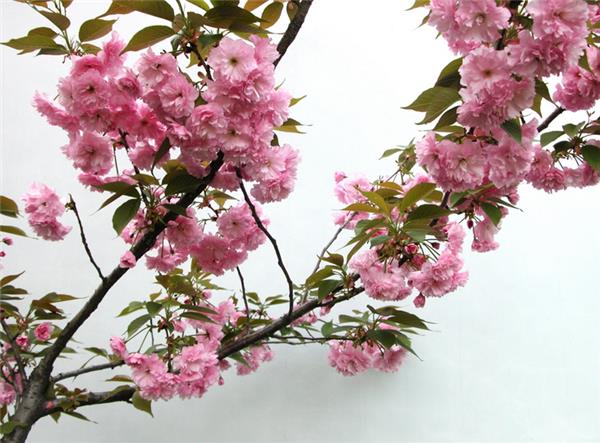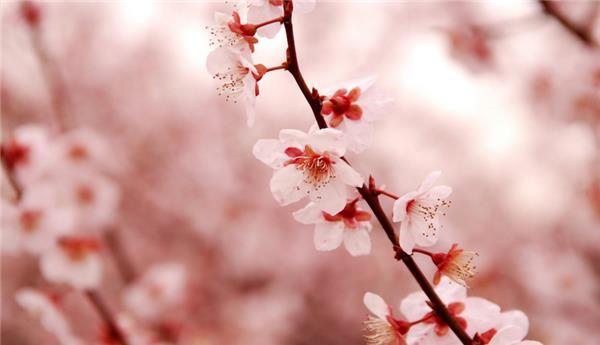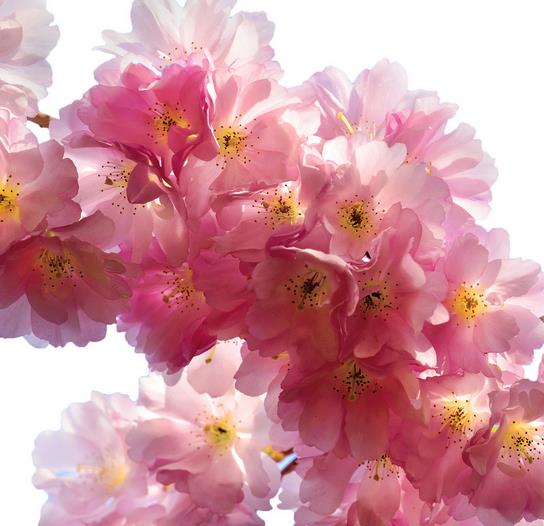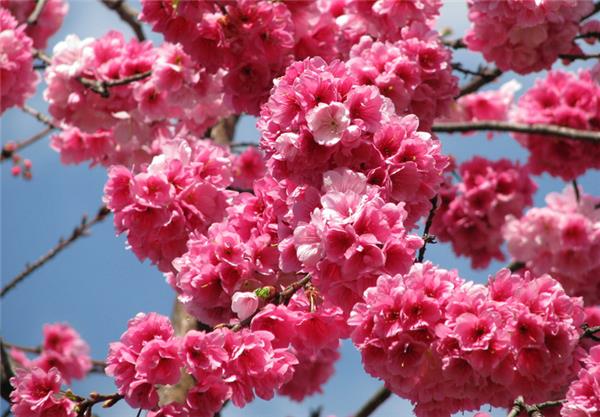Introduction and culture methods of romantic cherry blossoms in season
Cherry blossoms are often used for garden viewing. Cherry blossoms are regarded as a symbol of spring and are welcomed and loved by people of all countries. Let's take a look at the cherry blossom knowledge below.

I. Introduction to Cherry Blossom
Any of several plants of the subgenus Cherry in the genus Cherry of the Rosaceae family, native to temperate Himalayan regions of the Northern Hemisphere and cultivated worldwide. Cherry trees for deciduous, bark purple brown, flowers alternate, edge awns teeth, dark green surface, shiny. Each flower has three or five flowers, forming umbels, with notches at the apex of the petals, and the colors are mostly white and pink. Flowers bloom in March with or after leaves. Cherry blossoms can be made into sushi, and leaves can also be processed into pickles.

2. Cultivation techniques of cherry blossoms
Sowing, transplanting and grafting are the main breeding methods. Cherry blossoms should be propagated by sowing method, and attention should be paid not to make the embryo dry, but to sow immediately after picking or wet sand stratification in spring of the following year. Grafting propagation can be cherry, cherry hill seedlings as rootstock. Cut in late March or bud in late August, after 3 to 4 years of cultivation, can be planted out of the nursery. When planting, 15~25 kg of decomposed compost is applied to each pit groove, and 1~2 kg of ammonium sulfate is applied to each plant in July. After flowering and before germination in early spring, it is necessary to cut off dead branches, weak branches and excessive branches, and try to avoid pruning thick branches to keep the crown complete.
1. soil selection
Cherry blossoms can grow well in sandy loam and clay loam with more humus (pH 5.5 ~6.5). In the south, where the soil is sticky, it is generally mixed with self-made rotting soil (collected leaves and acidic soil, chicken manure, charcoal powder retting soil). Note that all the original clay blocks must be broken before mixing, otherwise it will not play a role in soil improvement. In the underground water table less than 1 meter of the place to adopt high planting method, that is, the whole planting hole after leveling, and then in the above pile of soil planting seedlings. Alkaline soil in the north, need to apply sulfur powder or ferrous sulfate to adjust the pH value to about 6. 2 grams of sulfur powder per square meter, valid for 1~2 years, and measured annually to make the pH value not exceed 7. Cherry, dye well Yoshino and other varieties of tree trunk straight, tree body larger, is a strong positive species, requiring shelter from the sun, ventilation and light transmission. When planting in patches, make sure that each tree receives sunlight.

2. young shoots
Usually cherry is propagated mainly by grafting. Single petal cherry or cherry is used as rootstock. Cutting or splitting before flowering in early spring is rarely reported. In recent years, we carried out the propagation experiment of cherry shoots by cutting. The results showed that the average rooting rate was above 95% within 25 days after cutting. The maximum number of roots per plant could reach 20, most of which belonged to cortical roots. There were callus roots. The survival rate of transplanting was above 90%.
3. planting
Planting time in early spring soil thaw immediately after planting, usually in February and March. Prepare the soil carefully before planting. For planting on flat ground, holes with a diameter of 1 meter and a depth of 0.8 meters can be dug. Fill the hole with about half of the improved soil, put the seedlings in the center of the hole, so that the roots of the seedlings extend in all directions. After a small amount of soil filling, slightly upward seedlings, so that the root system fully extended, and then lightly tread. Seedling planting depth to make the uppermost seedling roots 5 cm from the ground. After planting, make a ponding nest, and fully irrigate, and finally use bamboo chips that are almost as high as seedlings to prevent wind blowing down.
4. and drought prevention
After planting, seedlings are vulnerable to drought. In addition to full irrigation at planting, irrigation once every 8~10 days to keep the soil moist but without ponding. After irrigation, loosen the soil in time. It is best to cover the surface with grass to reduce water evaporation. Within 2 to 3 years after planting, straw can be wrapped to prevent drying of the trunk. However, after 2 to 3 years, the seedlings grow new roots and gradually increase their adaptability to the environment, so there is no need to pack grass again.
5. anagen management
Cherry blossoms are fertilized twice a year, preferably with acidic fertilizers. One time is winter fertilizer, applying organic fertilizer such as bean cake, chicken manure and decomposed fertilizer in winter or early spring; the other time is after flower drop, applying quick-acting fertilizer such as ammonium sulfate, ferrous sulfate and calcium superphosphate. Generally large cherry tree fertilization, can take the method of hole application, that is, in the crown: the edge of the positive projection line, dig a depth of about 10 cm circular groove, fertilizer application. This method is not only simple but also beneficial to root absorption. Later, with the growth of trees, the diameter and depth of the circular groove for fertilization will increase. Cherry root system distribution shallow, requires good drainage and ventilation, so in the tree around the root system distribution range, avoid people, animals, vehicles solid soil. Pedestrian trampling will weaken the tree, shorten its life span, and even cause root rot and death.
6. pruning and curing
Pruning is mainly to cut off withered branches, excessive branches, overlapping branches and diseased branches. In addition, when many branches grow on the trunk of a large cherry tree, a number of strong branches should be retained, and the rest should be cut off from the base to facilitate ventilation and light transmission. After pruning, the branches should be disinfected with medicine in time to prevent the invasion of germs after rain, resulting in decay. Cherry by long-term sun exposure, bark easy to aging damage, resulting in decay, should be removed in time and disinfection. After that, the rotten parts were bandaged with decayed leaf soil and charcoal powder to promote their normal physiological functions.

7. Requirements for soil
Cherry blossoms can grow in sand and clay. In places where the water level is less than 1 meter, it is better to plant seedlings in the soil after leveling the planting holes. Cherry trees are big, like sunshine, afraid of wind. Cherry blossoms are planted in early spring, usually in February to March.
8. planting method
Before planting, the ground should be leveled. A pit with a diameter of 0.8 meters by a depth of 0.6 meters can be dug. The pit should be filled with 10 cm of organic fertilizer first. The seedlings should be placed in the pit so that the roots of the seedlings can spread around. After filling cherry trees, lift the seedlings upward so that the roots are deeply spread, and then carry out steadiness. Planting depth is about 5 cm from the upper layer of seedling roots. After planting, water, irrigate fully, and stand with sticks to prevent strong wind from blowing down.
The above is the knowledge of cherry blossoms, I hope it can help you.
Cherry by long-term sun exposure, bark easy to aging damage, resulting in decay, should be removed in time and disinfection. After that, the rotten parts were bandaged with decayed leaf soil and charcoal powder to promote their normal physiological functions.

7. Requirements for soil
Cherry blossoms can grow in sand and clay. In places where the water level is less than 1 meter, it is better to plant seedlings in the soil after leveling the planting holes. Cherry trees are big, like sunshine, afraid of wind. Cherry blossoms are planted in early spring, usually in February to March.
8. planting method
Before planting, the ground should be leveled. A pit with a diameter of 0.8 meters by a depth of 0.6 meters can be dug. The pit should be filled with 10 cm of organic fertilizer first. The seedlings should be placed in the pit so that the roots of the seedlings can spread around. After filling cherry trees, lift the seedlings upward so that the roots are deeply spread, and then carry out steadiness. Planting depth is about 5 cm from the upper layer of seedling roots. After planting, water, irrigate fully, and stand with sticks to prevent strong wind from blowing down.
The above is the knowledge of cherry blossoms, I hope it can help you.
Related
- Wuhan Hospital Iron Tree Blooming Result Was Instantly Frightened by the Gardener Master
- Which variety of camellia is the most fragrant and best? Which one do you like best?
- What is the small blue coat, the breeding methods and matters needing attention of the succulent plant
- Dormancy time and maintenance management of succulent plants during dormancy
- Minas succulent how to raise, Minas succulent plant pictures
- What are the varieties of winter succulent plants
- How to raise succulent plants in twelve rolls? let's take a look at some experience of breeding twelve rolls.
- Attention should be paid to water control for succulent plants during dormant period (winter and summer)
- Watering experience of twelve rolls of succulent plants
- Techniques for fertilizing succulent plants. An article will let you know how to fertilize succulent plants.



